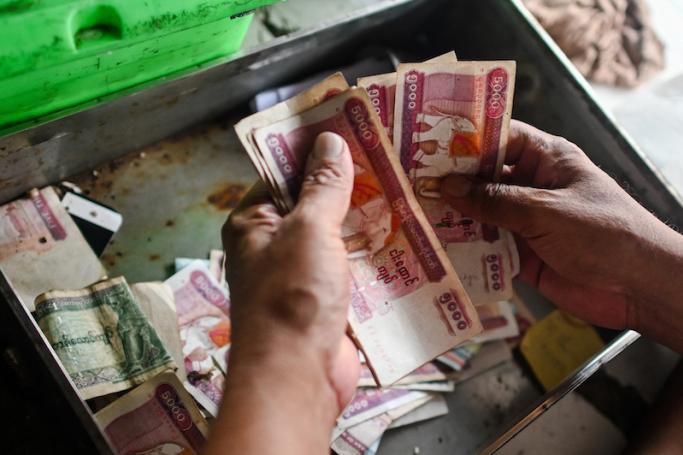A recently released policy brief from the World Bank on the financial sector in Myanmar recounts the challenges and destabilization faced by the financial sector in the wake of the COVID-19 restrictions and the 2021 military coup, including moves to restrict foreign currency holdings.
All gains of financial sector reforms and efforts of integration with the global financial system undertaken since 2010 have been under strain, with the country moving towards “financial isolation”, according to the report entitled: Myanmar Financial Sector Reforms, published on 8 July.
The report was released during a period in which the Myanmar junta is seeking to tighten controls on foreign currency, and been sending out contradictory orders regarding foreign currency ownership.
The Central Bank of Myanmar this week reversed its position on exempting foreign companies from forced exchanges of currency to the local kyat, according to a report by Nikkei Asia. The central bank in April had instructed financial institutions to convert foreign currency earned by its customers into kyat within one business day. Existing foreign-currency deposits were also to be converted into the kyat in stages.
In mid-June, the bank issued a notice exempting companies that are 10 per cent or more owned by overseas entities, which applied to the majority of foreign companies doing business in Myanmar. Now it has rescinded this exception in a new notice, sources told Nikkei Asia. This could have a dramatic effect on the foreign investors in Myanmar who have not yet left the country.
The World Bank report says both COVID-19 and the coup have shocked Myanmar’s financial system.
“Events in the last two years have served to seriously undermine the hard-won progress made in bringing Myanmar’s financial sector into the 21st century. While Myanmar’s financial sector was not alone in experiencing the debilitating impact of the COVID-19 pandemic, the coup of February 1, 2021, and the political and economic uncertainty that followed have uniquely de-stabilized the system. The sanctions imposed by the international community after the coup and Myanmar’s pre-existing FATF grey listing are once again pushing the financial system into isolation.
“Despite the lack of reliable data, it is possible to infer that a range of financial institutions in Myanmar have been severely impacted on the liquidity, asset quality, and solvency fronts.”
The most worrying factor is the loss public confidence in the financial sector that has been painstakingly built over the decade. Long queues at ATM centres, withdrawal limits, foreign remittance restrictions witnessed over the past year have all created a sense of panic and it is reported that over 70 per cent of domestic deposits parked with the banks have been withdrawn.
According to the World Bank: “Liquidity pressures have persisted as the public continues to be cautious about new deposits, both kyat and hard currency deposits. And it is not clear to what extent financial institutions have been able to meet credit needs, including for critical sectors such as agriculture.”
A result of this would be further moves towards a cash-based economy.
As the World Bank report says: “Faced with a rapidly depreciating kyat and a general shortage of hard currency the CBM has resorted to increasingly draconian measures to ration the public’s access to hard currency.
“The key measures adopted by CBM can be summarized into five broad categories: i) it
responded to the depreciation of the kyat by temporarily suspending the reference rate and by adopting several measures aimed at slowing down the MMK depreciation; ii) it suspended the free spread range and revisited the managed floating exchange rate; iii) it allowed the use of additional currencies as settlement currencies including the Chinese yuan and the Japanese yen; iv) it sold a significant amount of USD in the market, but in recent months due to the shortage of USD, it reduced these sales significantly to around US$30 million during February and March 2022; v) it proactively used bilateral currency to support trade, reduce USD-MMK exchange rate volatility and promote local currency in line with the ASEAN Financial Integration.
“Most recently, on April 3, 2022, the CBM issued a notification on repatriation of foreign currency and conversion into Myanmar Kyat (MMK) and then subsequently they issued three related instructions (for inward remittance, outward remittance, and exemption) to the Authorized Dealers (AD) licensed banks.
“The CBM also issued on April 7, 2022 an instruction to banks on limiting card payments, as a way to control the outflow of USD abroad. Subsequent exceptions for foreign entities, and their employees and the widening gap between the official and parallel market exchange rates have raised questions about the effectiveness and sustainability of these measures,” the report says.
Now media reports, as seen the Nikkei Asia release, indicate the CBM has retreated to a protective position where foreign investors and local bank holders have a serious control put on their foreign currency holdings. Foreign currency holdings now have to be converted to Kyat within a day.
Finally, the World Bank report says: “Pre-existing risks and vulnerabilities in Myanmar’s financial sector have been exacerbated by the February 2021 coup, with important implications for the country’s financial stability, even as official data indicates that the system has remained stable or even improved.”












